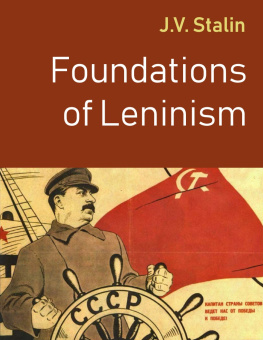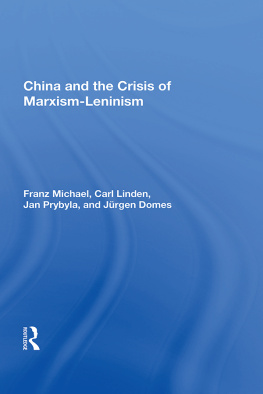Josef Stalin - Foundations of Leninism
Here you can read online Josef Stalin - Foundations of Leninism full text of the book (entire story) in english for free. Download pdf and epub, get meaning, cover and reviews about this ebook. year: 1924, publisher: Marxists Internet Archive, genre: Politics. Description of the work, (preface) as well as reviews are available. Best literature library LitArk.com created for fans of good reading and offers a wide selection of genres:
Romance novel
Science fiction
Adventure
Detective
Science
History
Home and family
Prose
Art
Politics
Computer
Non-fiction
Religion
Business
Children
Humor
Choose a favorite category and find really read worthwhile books. Enjoy immersion in the world of imagination, feel the emotions of the characters or learn something new for yourself, make an fascinating discovery.
- Book:Foundations of Leninism
- Author:
- Publisher:Marxists Internet Archive
- Genre:
- Year:1924
- Rating:5 / 5
- Favourites:Add to favourites
- Your mark:
- 100
- 1
- 2
- 3
- 4
- 5
Foundations of Leninism: summary, description and annotation
We offer to read an annotation, description, summary or preface (depends on what the author of the book "Foundations of Leninism" wrote himself). If you haven't found the necessary information about the book — write in the comments, we will try to find it.
Foundations of Leninism — read online for free the complete book (whole text) full work
Below is the text of the book, divided by pages. System saving the place of the last page read, allows you to conveniently read the book "Foundations of Leninism" online for free, without having to search again every time where you left off. Put a bookmark, and you can go to the page where you finished reading at any time.
Font size:
Interval:
Bookmark:
Foundations
of Leninism
J. V. Stalin
1924
Marxists Internet Archive
Note: This book contains a series of lectures delivered at the Sverdlov University, Moscow, in the beginning of April 1924, shortly after the death of Lenin. The book was dedicated by the author to the new members of the Communist Party of the Soviet Union recruited in the Lenin memorial enrollment.
Marxists Internet Archive
marxists.org/reference/archive/stalin/works/1924/foundations-leninism/
Source:Works Volume 6, pages 71-196.
First Published: Foreign Languages Publishing House, Moscow: 1953
Online Version: Marxists Internet Archive, May 2008
Transcription: Victor Barraza
Ebook Version: Daniel Leonard
Ebook Date: 2018-04-14
Contents
The foundations of Leninism is a big subject. To exhaust it a whole volume would be required. Indeed, a whole number of volumes would be required. Naturally, therefore, my lectures cannot be an exhaustive exposition of Leninism; at best they can only offer a concise synopsis of the foundations of Leninism. Nevertheless, I consider it useful to give this synopsis, in order to lay down some basic points of departure necessary for the successful study of Leninism.
Expounding the foundations of Leninism still does not mean expounding the basis of Lenins world outlook. Lenins world outlook and the foundations of Leninism are not identical in scope. Lenin was a Marxist, and Marxism is, of course, the basis of his world outlook. But from this it does not at all follow that an exposition of Leninism ought to begin with an exposition of the foundations of Marxism. To expound Leninism means to expound the distinctive and new in the works of Lenin that Lenin contributed to the general treasury of Marxism and that is naturally connected with his name. Only in this sense will I speak in my lectures of the foundations of Leninism.
And so, what is Leninism?
Some say that Leninism is the application of Marxism to the conditions that are peculiar to the situation in Russia. This definition contains a particle of truth, but not the whole truth by any means. Lenin, indeed, applied Marxism to Russian conditions, and applied it in a masterly way. But if Leninism were only the application of Marxism to the conditions that are peculiar to Russia it would be a purely national and only a national, a purely Russian and only a Russian, phenomenon. We know, however, that Leninism is not merely a Russian, but an international phenomenon rooted in the whole of international development. That is why I think this definition suffers from one-sidedness.
Others say that Leninism is the revival of the revolutionary elements of Marxism of the forties of the nineteenth century, as distinct from the Marxism of subsequent years, when, it is alleged, it became moderate, non-revolutionary. If we disregard this foolish and vulgar division of the teachings of Marx into two parts, revolutionary and moderate, we must admit that even this totally inadequate and unsatisfactory definition contains a particle of truth. This particle of truth is that Lenin did indeed restore the revolutionary content of Marxism, which had been suppressed by the opportunists of the Second International. Still, that is but a particle of the truth. The whole truth about Leninism is that Leninism not only restored Marxism, but also took a step forward, developing Marxism further under the new conditions of capitalism and of the class struggle of the proletariat.
What, then, in the last analysis, is Leninism?
Leninism is Marxism of the era of imperialism and the proletarian revolution. To be more exact, Leninism is the theory and tactics of the proletarian revolution in general, the theory and tactics of the dictatorship of the proletariat in particular. Marx and Engels pursued their activities in the pre-revolutionary period, (we have the proletarian revolution in mind), when developed imperialism did not yet exist, in the period of the proletarians preparation for revolution, in the period when the proletarian revolution was not yet an immediate practical inevitability. But Lenin, the disciple of Marx and Engels, pursued his activities in the period of developed imperialism, in the period of the unfolding proletarian revolution, when the proletarian revolution had already triumphed in one country, had smashed bourgeois democracy and had ushered in the era of proletarian democracy, the era of the Soviets.
That is why Leninism is the further development of Marxism.
It is usual to point to the exceptionally militant and exceptionally revolutionary character of Leninism. This is quite correct. But this specific feature of Leninism is due to two causes: firstly, to the fact that Leninism emerged from the proletarian revolution, the imprint of which it cannot but bear; secondly, to the fact that it grew and became strong in clashes with the opportunism of the Second International, the fight against which was and remains an essential preliminary condition for a successful fight against capitalism. It must not be forgotten that between Marx and Engels, on the one hand, and Lenin, on the other, there lies a whole period of undivided domination of the opportunism of the Second International, and the ruthless struggle against this opportunism could not but constitute one of the most important tasks of Leninism.
- The Historical Roots of Leninism
Leninism grew up and took shape under the conditions of imperialism, when the contradictions of capitalism had reached an extreme point, when the proletarian revolution had become an immediate practical question, when the old period of preparation of the working class for revolution had arrived at and passed into a new period, that of direct assault on capitalism.
Lenin called imperialism moribund capitalism. Why? Because imperialism carries the contradictions of capitalism to their last bounds, to the extreme limit, beyond which revolution begins. Of these contradictions, there are three which must be regarded as the most important.
The first contradiction is the contradiction between labour and capital. Imperialism is the omnipotence of the monopolist trusts and syndicates, of the banks and the financial oligarchy, in the industrial countries. In the fight against this omnipotence, the customary methods of the working class-trade unions and cooperatives, parliamentary parties and the parliamentary struggle-have proved to be totally inadequate. Either place yourself at the mercy of capital, eke out a wretched existence as of old and sink lower and lower, or adopt a new weapon-this is the alternative imperialism puts before the vast masses of the proletariat. Imperialism brings the working class to revolution.
The second contradiction is the contradiction among the various financial groups and imperialist Powers in their struggle for sources of raw materials, for foreign territory. Imperialism is the export of capital to the sources of raw materials, the frenzied struggle for monopolist possession of these sources, the struggle for a re-division of the already divided world, a struggle waged with particular fury by new financial groups and Powers seeking a place in the sun against the old groups and Powers, which cling tenaciously to what they have seized. This frenzied struggle among the various groups of capitalists is notable in that it includes as an inevitable element imperialist wars, wars for the annexation of foreign territory. This circumstance, in its turn, is notable in that it leads to the mutual weakening of the imperialists, to the weakening of the position of capitalism in general, to the acceleration of the advent of the proletarian revolution and to the practical necessity of this revolution.
The third contradiction is the contradiction between the handful of ruling, civilised nations and the hundreds of millions of the colonial and dependent peoples of the world. Imperialism is the most barefaced exploitation and the most inhumane oppression of hundreds of millions of people inhabiting vast colonies and dependent countries. The purpose of this exploitation and of this oppression is to squeeze out super-profits. But in exploiting these countries imperialism is compelled to build these railways, factories and mills, industrial and commercial centres. The appearance of a class of proletarians, the emergence of a native intelligentsia, the awakening of national consciousness, the growth of the liberation movement-such are the inevitable results of this policy. The growth of the revolutionary movement in all colonies and dependent countries without exception clearly testifies to this fact. This circumstance is of importance for the proletariat inasmuch as it saps radically the position of capitalism by converting the colonies and dependent countries from reserves of imperialism into reserves of the proletarian revolution.
Next pageFont size:
Interval:
Bookmark:
Similar books «Foundations of Leninism»
Look at similar books to Foundations of Leninism. We have selected literature similar in name and meaning in the hope of providing readers with more options to find new, interesting, not yet read works.
Discussion, reviews of the book Foundations of Leninism and just readers' own opinions. Leave your comments, write what you think about the work, its meaning or the main characters. Specify what exactly you liked and what you didn't like, and why you think so.











